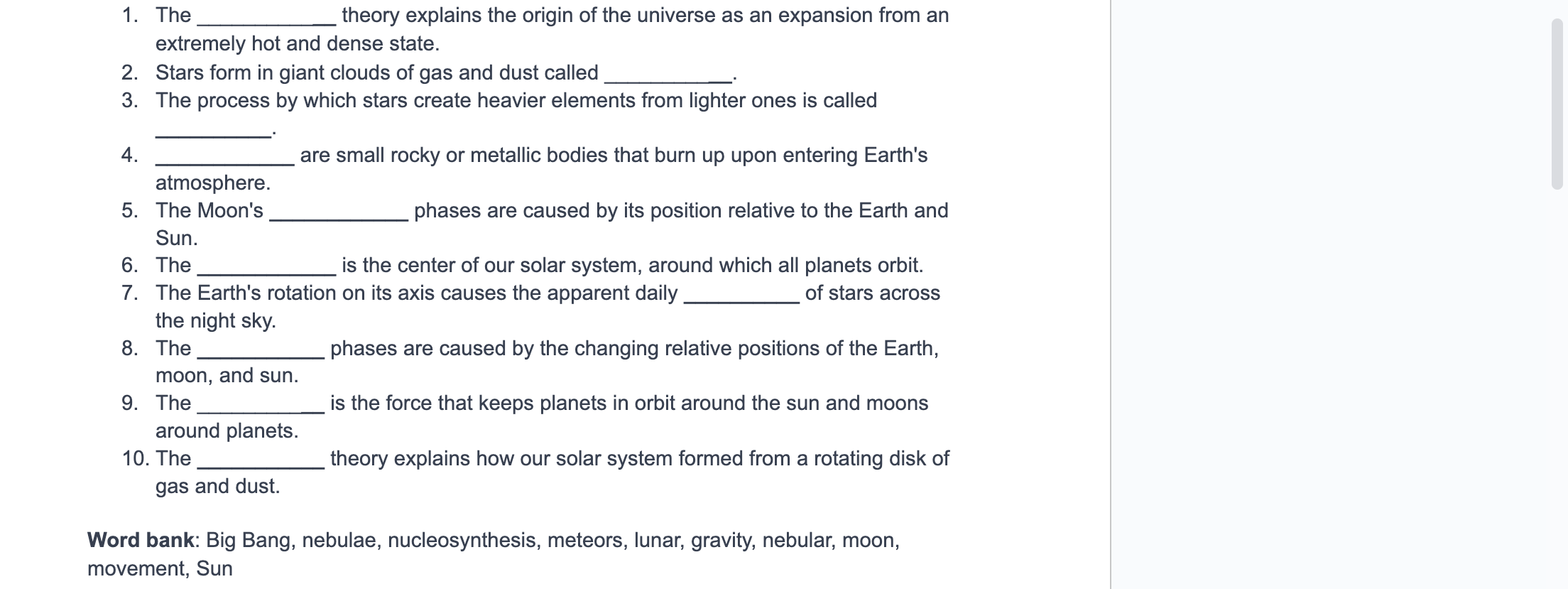1. The __________ theory explains the origin of the universe as an extremely hot and dense state. 2. Stars form in giant clouds of gas and dust called __________. 3. The process by... 1. The __________ theory explains the origin of the universe as an extremely hot and dense state. 2. Stars form in giant clouds of gas and dust called __________. 3. The process by which stars create heavier elements from lighter ones is called __________. 4. __________ are small rocky or metallic bodies that burn up upon entering Earth's atmosphere. 5. The Moon's __________ phases are caused by its position relative to the Earth and Sun. 6. The __________ is the center of our solar system, around which all planets orbit. 7. The Earth's rotation on its axis causes the apparent daily __________ of stars across the night sky. 8. The __________ phases are caused by the changing relative positions of the Earth, moon, and sun. 9. The __________ is the force that keeps planets in orbit around the sun and moons around planets. 10. The __________ theory explains how our solar system formed from a rotating disk of gas and dust.

Understand the Problem
The question involves filling in the blanks in a series of statements related to astronomy concepts using a provided word bank. It requires knowledge of terms such as 'Big Bang,' 'nebulae,' and others.
Answer
1. Big Bang, 2. Nebulae, 3. Nucleosynthesis, 4. Meteors, 5. Lunar, 6. Sun, 7. Movement, 8. Lunar, 9. Gravity, 10. Nebular
- Big Bang 2. Nebulae 3. Nucleosynthesis 4. Meteors 5. Lunar 6. Sun 7. Movement 8. Lunar 9. Gravity 10. Nebular
Answer for screen readers
- Big Bang 2. Nebulae 3. Nucleosynthesis 4. Meteors 5. Lunar 6. Sun 7. Movement 8. Lunar 9. Gravity 10. Nebular
More Information
These answers cover key astronomical concepts including the origin and development of the universe and solar system, the role of gravity, star formation, and lunar phases.
Tips
Ensure the use of terms specifically related to astronomical phenomena and not to mix them with unrelated sciences.
Sources
- 3.1 Origin of Earth and the Solar System - rwu.pressbooks.pub
- The Big Bang Theory - University of Louisville - louisville.edu
- Formation of Our Solar System | AMNH - amnh.org
AI-generated content may contain errors. Please verify critical information